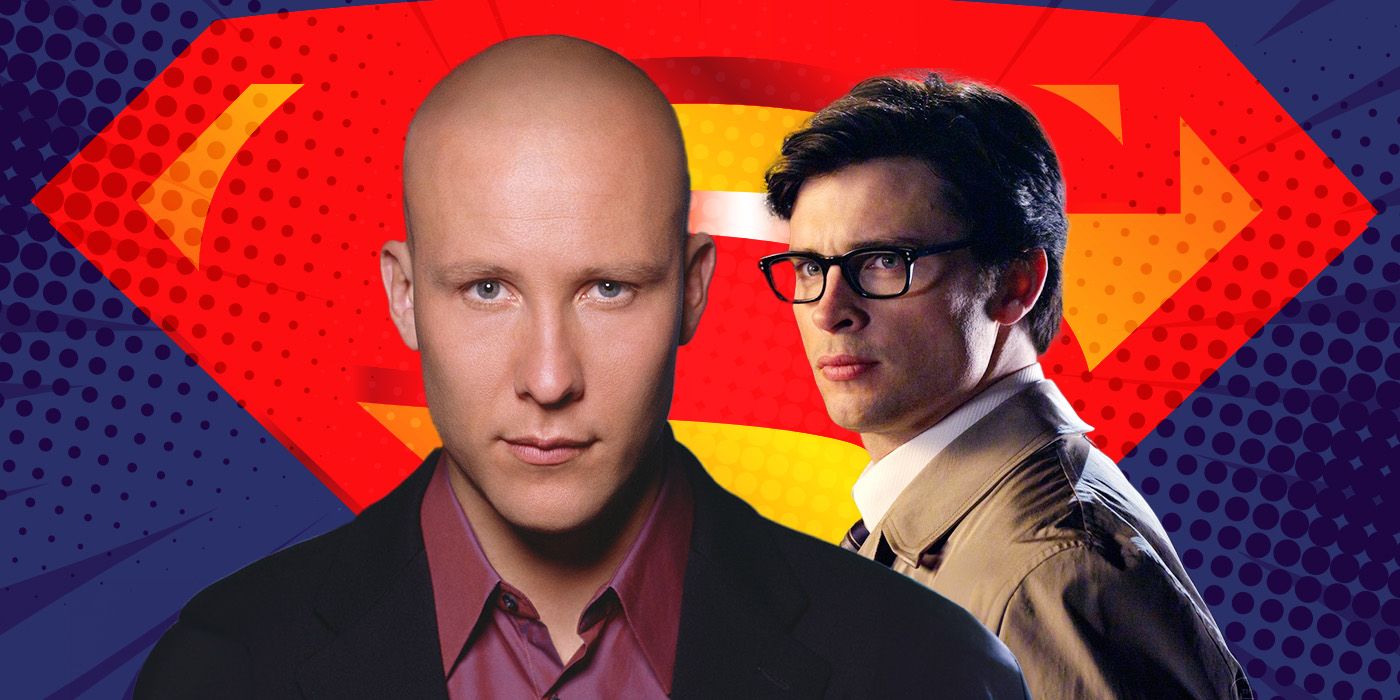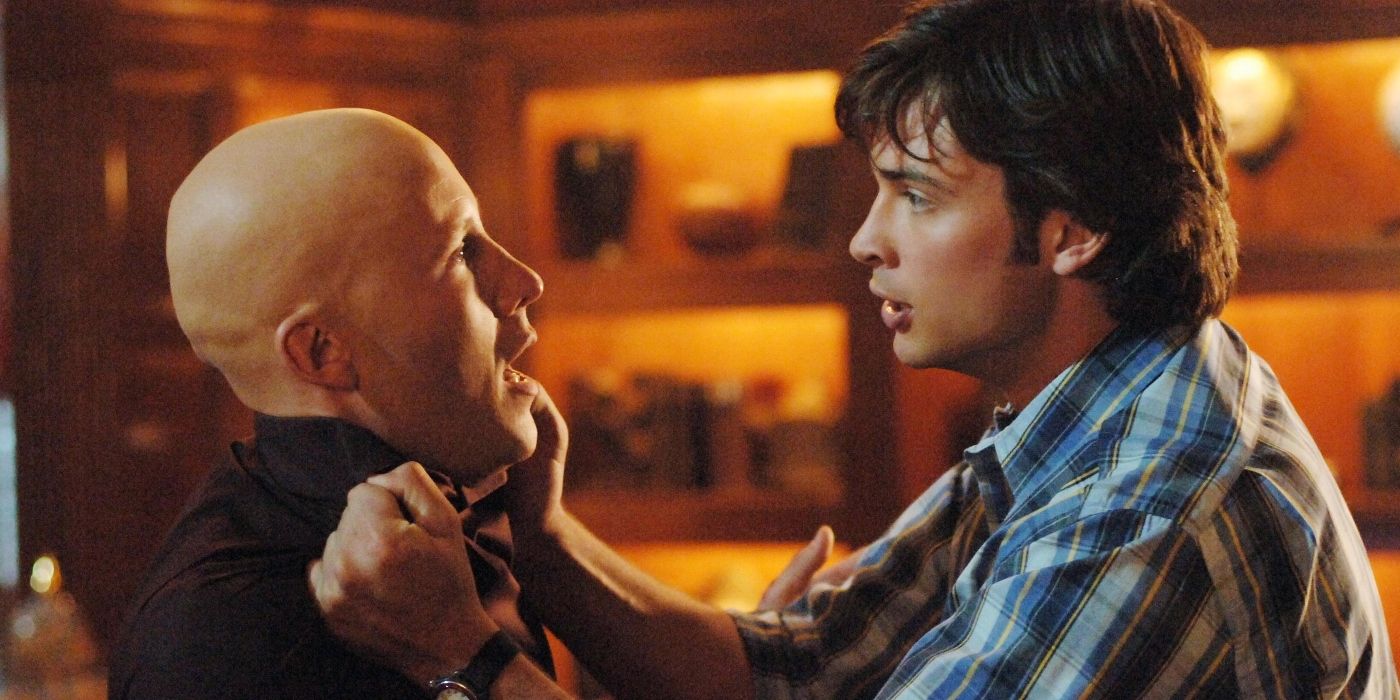The Big Picture
- Smallville's Lex Luthor, portrayed by Michael Rosenbaum, steals the show with his well-rounded and captivating character.
- The friendship and inevitable downfall of Clark Kent and Lex Luthor adds a unique and compelling dynamic to the series.
- The Luthor family drama, particularly the strained relationship between Lex and his father Lionel, adds depth to the Superman series.
We all know that Smallville is about a young Clark Kent (Tom Welling) on his way to becoming Superman. It takes him a decade to get there, but once he's there, it feels both earned and about time. But what makes Smallville, especially in its earlier years, work so well is the well-placed juxtaposition between Clark and his best frienemy Lex Luthor, played to perfection by Michael Rosenbaum. Smallville's Lex steals the show in every scene he's in, and it's because of his ultimate destiny that we hope (beyond hope) that he won't fall into that same dark pit he always does. Yeah, Smallville is about becoming Superman, but it works because we also get to see the origins of Lex Luthor.

Smallville
A young Clark Kent struggles to find his place in the world as he learns to harness his alien powers for good and deals with the typical troubles of teenage life in Smallville, Kansas.
- Release Date
- October 16, 2001
- Creator
- Alfred Gough, Miles Millar
- Cast
- Tom Welling , Cassidy Freeman , Erica Durance , Justin Hartley
- Seasons
- 10
'Smallville's Michael Rosenbaum Thrives as a Conflicted Lex Luthor
In Smallville's early years, you can't help but hope that Lex wouldn't turn out like his father, especially as his friendship with Clark inspired him to be a better man. Michael Rosebaum's portrayal of Lex was considerably different from prior live-action depictions, complete with both good and bad qualities that made him feel anything but one-dimensional. Rosenbaum found impressive ways to showcase Lex's humanity, and the material written for him each week only further reflected that. Throughout the series, Lex tries desperately to remove himself from Lionel Luthor's (John Glover) influence. Despite that, his ultimate destiny had never been in question: he was always going to turn out like his father, and that was the tragedy of it.
But both nature and nurture had a profound effect on the Luthor heir, and by Season 5, he finally succumbed to his own darkness in a Christmas-themed episode that had the opposite impact as It's A Wonderful Life ("Lexmas"). By Seasons 6 and 7, Lex no longer shied away from morally impermissible deeds, and his questionable decision to experiment on metahumans and alien technologies, consequences be damned, was justified by his personal quest to save the world. As impressive as Rosenbaum's portrayal of the "good guy" Lex was early on, whenever he leaned into that villainous side, he always stole the show. Episodes like "Onyx," "Fracture," "Apocalypse," and the superhero extravaganza "Justice" highlighted the Lex Luthor we all knew from the original DC Comics and effectively sealed his fate.
No matter if he was playing Lex as sympathetic, antagonistic, or downright psychotic, Michael Rosenbaum commanded your full attention on screen. After all, Lex always saw himself as the victim, and in the classic and unfortunate case of the abused becoming the abuser, Lex eventually became the very thing he hated. Rosenbaum's charisma in playing Lex, as a billionaire playboy with a heart of gold at first and a conniving supervillain later, was always so layered and dynamic that you wished he was in almost every scene. The truth is, just as Smallville wouldn't exist without Clark Kent, it wouldn't have lasted so long without Lex Luthor.
Clark Kent and Lex Luthor's Bond Made 'Smallville' a Unique Superman Story
Though Clark spent many years pining after Lana Lang (Kristin Kreuk), Smallville was really more about the friendship between Clark and Lex than it was anything else. Yes, the show chronicled Clark's journey to becoming Superman, and yes, eventually, the love story between Clark Kent and Lois Lane (Erica Durance) as well, but the reason the show thrived early on wasn't just because of the small-town superhero aesthetic, it was because the friendship between Clark and Lex was doomed to implode, and we couldn't look away. After years of being saved by Clark, and watching his former best friend become a hero in the eyes of those he cared most about, Lex deluded himself into thinking he could do the same despite his actions speaking to the contrary.
Early episodes of Smallville often discussed themes of destiny and fate, with heartfelt codas at the end about writing your own story. This was considerably true of the friendship between the show's two leads, and oftentimes, episodes like "Hug" made sure to poke at that idea (while giving Rosenbaum the best lines, of course). "Our friendship is going to be the stuff of legends," Lex tells Clark at the end of the episode, reassuring him that they'll never end up like the episode's antagonist and his former best friend. The problem was always that we knew where the story was going, and as much as we wanted to see Clark Kent become Superman, we grieved the fact that Lex Luthor also had to eventually fulfill his destiny as the greatest criminal mind of our time.
Marrying Lana, constructing a metahuman army, and killing his own father all had profound impacts on Lex's soul, and though he failed to acknowledge the shift inside, the audience watched in horror as he fell further from grace, begging him to about-face and return to the light. Possibly the most tragic character in all superhero media, Smallville's Lex Luthor was the first time Superman's arch-nemesis felt redeemable. Unfortunately, others didn't see it that way. By the time Lex confronts Clark about his secret in the Season 7 finale "Arctic" (Rosenbaum's final performance as a main cast member), he genuinely believes himself to be the hero. Lex's self-delusion becomes his greatest obstacle, and as a result, he believes that — like his childhood hero Warrior Angel — he's actually saving the world.
The Luthor Family Drama Keeps 'Smallville' Interesting
There's no denying that Clark is our hero, but it shouldn't surprise longtime fans of Smallville to hear that Lex Luthor and his broken family dynamics are the reason many stuck around. Of course, the Kents acted as a safe haven from the increasingly darker world and universe that Smallville continued to unfold the longer it went on, but the Luthors, well, they took center stage as Shakespearean tragedies played out on the other side of town. While the positive influence that Jonathan Kent (John Schneider) has on his son inspires both Clark and the audience, the verbal jests between Lex and his father Lionel Luthor never fail to excite and entertain, even if they rarely end well.
Lana Lang aside, (though she, too, becomes a Luthor later on) the most dramatic (and therefore spirited) characters in Smallville's catalog generally come from the Luthor dynasty. The power dynamics the LuthorCorp magnates hold over each other makes for compelling and fascinating television. In dark contrast to the beautiful father/son relationship between Clark and Jonathan, Lex and Lionel's strained connection is what ultimately sets our tragic villain on his fated path. Before that, it once inspired him to be different, but seeing that money and power are what ultimately get you ahead in life, Lex eventually takes to heart the very lessons his father tried to teach him in his youth. Lex and Lionel's respective struggles for power and superiority over the other keep tensions high through the first seven seasons, and somehow the Luthor family chess match never gets old.
The way that Michael Rosenbaum and John Glover play off one another is like an intricate dance that's impossible to master, yet these Smallville actors do just that. The conflict between Lex and his father is arguably the biggest struggle Lex faces in the series, so when he finally kills Lionel in Season 7, it came as no surprise, then, that Lex turned his full attention to destroying Clark afterward. The biggest downside was that we'd never see the two of them engage in that dance on screen again. Ironically, after all the years of hatred between them, it's an alternate universe version of Lionel (who remains evil) who gives up his life at the end of the series to usher in Lex's return in the series finale. But since Lex has been finished with Lionel for years, he doesn't give it a second thought.
'Smallville' Really Changed When Lex Luthor Left
The final three seasons of Smallville feel significantly different from the first seven, and there's a good reason for that. Aside from the departure of series creators Al Gough and Miles Millar, cast members such as Kristin Kreuk, Laura Vandervoort, John Glover, and even Michael Rosenbaum were written out as well. As a result, each season featured a new big bad to fill the Lex-sized hole in Smallville's heart (and pushed forward to become the superhero show fans were hoping it would be for years), but just because Rosenbaum was gone didn't mean that Lex was no longer involved. Despite the actor's departure, Smallville couldn't move past the Luthor dynasty and instead created the placeholder of Tess Mercer (Cassidy Freeman), who was eventually revealed to be Lex's half-sister in the final season.

There’s Never Been a Better Time for a ‘Smallville’ Movie
With Superman stories surging in popularity, the time is right to return to one of the Man of Steel's definitive incarnations.Beyond that, Lex himself continued to have a real impact on the show from the great beyond. Season 8 featured a broken and recovering Lex (played by Kevin Miller) for a few episodes before he was unceremoniously blown apart by Oliver Queen/Green Arrow (Justin Hartley). With two significant mentions in Season 9 and a bunch of foreshadowing in Season 10, Rosenbaum finally returned as a resurrected Lex in the series finale aptly titled "Finale." What's especially fascinating about his triumphant return is that his death had a different impact on him than one might've thought. Instead of changing his ways and mending the fences he burned in Smallville, Lex returns having embraced his dark destiny as "the villain of the story," and urges Clark to do the same by embracing his own.
Of course, this is only temporary, as his memories are soon wiped out by his sister Tess after he fatally wounds her. Nevertheless, Lex still makes it to the Oval Office as the President of the United States. (Though we can only hope that, given his memory wipe, Lex may walk a different path, having been freed of the trauma he experienced in his first life.) Perhaps the fact that Lionel changed over the course of the series means that Lex could do the same. Even the Arrowverse's Crisis On Infinite Earths crossover event (if you consider that a true epilogue to Smallville) seems to imply that concept after an older Clark is revealed to have given up his abilities during Lex's tenure in office. But however the rest of Lex Luthor's life plays out post-Smallville, he remains the show's most developed and complex character, and we wouldn't have him any other way.
Smallville is available to watch on Hulu in the U.S.


